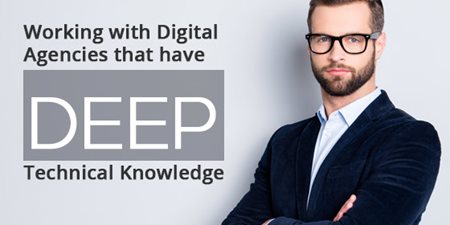Partnerships Done Well: How to Pick the Right Agency
Before the Mad Men era, there were only a few powerhouse agencies that brands could partner with to yield results from a memorable poster, radio spot or print ad. Fast forward to today and those results are now digital experiences and digital marketing but there are way more players in the game. Almost anywhere you look you can find an agency. Some claim to do it all while others are specific to one kind of digital need like videos, mobile APPS, experiential-based marketing or just social media. With so many readily available agencies to choose from you’d think all would work well and the result will be exactly  what you need, issue free.
what you need, issue free.
Thus begins the search for an agency to partner with. First you are energized with their enthusiasm, expertise and presentation. Further wooed and awed by the visually stunning creative and flawless development of user personas that are a perfect representation of your customer. The information architecture and wireframes are sound and provide the foundation for your digital platform. But then they build it. At first glance, it works well, looks exactly like the designs and has all the features spec’d. But as more and more of your customers interact with the site, and your in-house team and IT crew work with it, the issues begin to emerge, and the partnership begins to change or devolve.
Any of this sound familiar to you? If so, know you’re not alone. This is unfortunately a situation seen all the time.
When selecting a digital agency to partner with, look for one with a deep technical knowledge. Look for agencies whose collaborative team is made up of strong versatile people and whom work very well together. The team should include experienced developers and people with significant years of hands-on experience building websites, apps, and software. These people can be dedicated roles or hybrid employees who are design engineers, Scrum/Agility coaches, Digital Project Managers and Product Owners.
Deep Technical Knowledge
In our ever-changing digital landscape, agencies that understand the requirement for deep technical knowledge and have staff and the agility to back it up have a competitive edge. While some may argue this, a strong technical knowledge is important in successfully completing digital projects and is often underestimated. A strongly rooted technical team can potentially be three to ten times more productive than other teams and employing technical talent can accelerate a project by even 20 to 30 percent.
When identifying strong and successful technical teams, they do seem to share some common traits:
- Customer-centric
- Work efficiently
- Responsive and flexible
- Create and provide owner insights
- Can process large amounts of data
- Deliver on multiple environments
- Flexible to integrate with outside platforms and technologies
- Deliver exceptional customer experiences
This requires the collective skills and strengths of a multidisciplinary and agile team rather than a frankensteined team of one-off talents. In short, the team needs to have strong technical skills but also to be able to function well as a team.
Some of the talent who make up a strongly technical team, outside of developers include:
Experience designers and engineers - They straddle the user experience, creative and technical world. They focus on getting to the heart of the customer through research, citizen-centric design, and growth-based design. Often, they will have skills as front-end developers, and understand the technical needs when starting a visual creative and often can create a working prototype.
Scrum Masters / Agile Project Managers - Bringing both strong leadership and enabling skills, scrum masters or agile project managers also bring a deep understanding of technology and ability to rapidly solve problems.
Product Owners - Often seen as the “mini-CEO”, product owners can define the vision of a product or service and can make decisions that deliver high value. They easily work with developers, engineers, experience designers, and other stakeholders in the business. They understand technology and user-experience issues to make the right decisions for the product or service features that need to be developed.
“DevOps” Engineers - DevOps - the integration of development and operations - bring experience to navigate a rapidly changing development and cloud-infrastructure ecosystem. They can build tools and automations to improve efficiencies and infrastructure.
Selecting a deeply rooted technical team as your agency partner will be rewarding. However, don’t forget in any relationship to listen to your gut/heart/head when selecting someone to work with. The partnership between yourself and those working on your account should feel natural and be one that you feel will be strong and successful.
Partnerships Done Well
Partnerships really are a key to the success with any business – being that a partnership with customers, employees or that of any agency you hire for your digital or technical needs. Working well with others and possessing the deep knowledge of what makes them tick, is essential to creating and sustaining successful partnerships.
When you unlock this secret – and unlock these with an agency you partner with, more times than not you will create an unstoppable and successful partnership. Below are some characteristics of creating unstoppable partnerships – and how to unlock these with an agency you partner with.
Supportive - Both parties need to feel a sense of support and optimism about the collaboration. When both sides are supportive, it provides energy, sustains motivation, and you work together to clearly visualize the process and project to achieve a common goal and resolve conflict.
A few examples of how this can make a strong agency-business partnership include:
-
Agencies need to provide support with expertise, knowledge sharing and resources.
-
Businesses need to provide support in direction, intelligence, background and providing resources.
Cohesion - Trust is a basic obligation for any successful partnership. Each side needs to work to make the relationship collaborative and be composed of individuals who view everyone as equals and show respect. They need to focus on solutions, not problems and commit to open communication.
A few examples of how this can make a strong agency-business partnership include:
-
Agencies need to provide clear, honest and open communication at all stages, proactively work to resolve any issues in timelines or deliverables, and share expertise and guidance in providing solutions.
-
Businesses need to provide clear, honest and open communication, report changes in project or staff, be open and work to resolve issues collaboratively.
Catalyst - Unstoppable partnerships act as a catalyst for everyone to grow and succeed. It should provide the capability to generate innovative ideas. Each side should yield as much flexibility and support to drive innovation, invention and success.
A few examples of how this can make a strong agency-business partnership include:
-
Agencies need to continually provide areas to improve or innovate the project, provide cost-saving or feature development ideas, explore how to provide other services.
-
Businesses need to be open to receiving new approaches or ways of doing things, discuss new business or feature ideas and open to new processes.
Service - Successful partnerships are based in service, not selfishness. The collaborative effort comes from both sides contributing to the greater good. Approach the project in the mind of service, to help others, have a healthy and open-minded feedback loop and allow the process of growth and innovation to unfold.
A few examples of how this can make a strong agency-business partnership include:
-
Agencies need to service oriented, customer-centric and uphold themselves at the highest of service.
-
Businesses need to be open to feedback, and provide feedback, and be flexible in how the process grows organically.
Ending Notes
When partnering with an agency, invest time into researching and exploring the technical expertise of their team. Will they meet your needs and requirements? Do they have the know-how to create something that will be code perfect and secure? Partnering with a deeply rooted technical team will provide businesses with the confidence and security that their project will be executed properly and also save you time and money in the long run.

Lynette Sawyer
Lynette Sawyer is a Web Project Manager for Falcon-Software, a digital web agency founded in 1994. For the last 13-years Lynette has been in various digital capacities and her expertise goes beyond Project Management. Lynette brings experience and knowledge in graphic design, marketing communications, project management, product management and engagement.